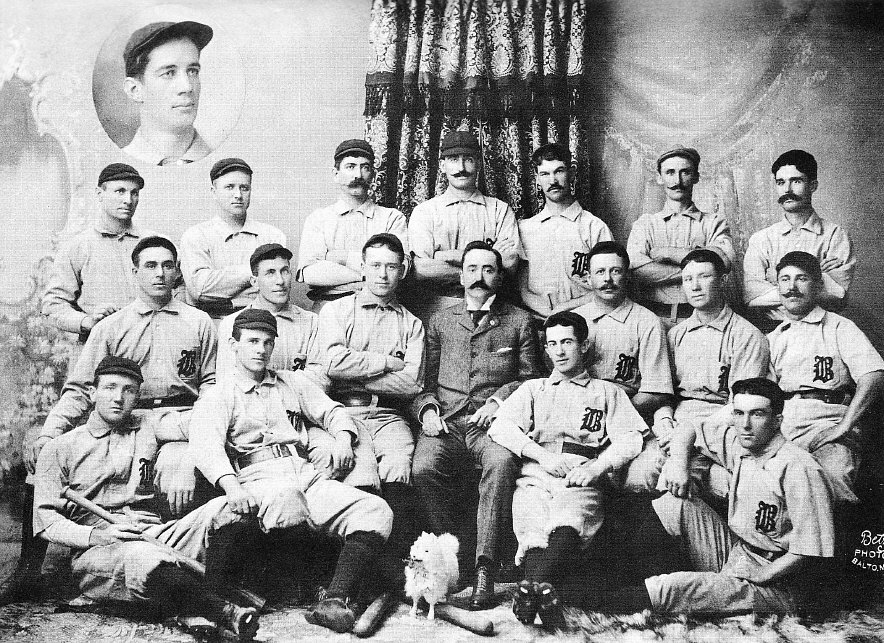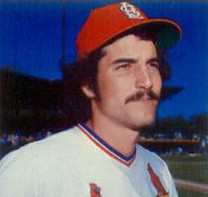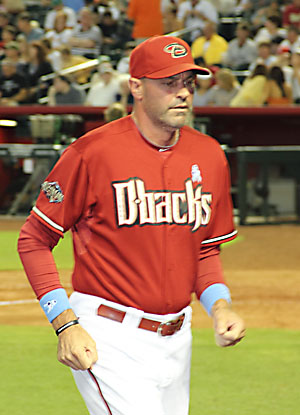|
Game-winning RBI
A game-winning RBI (GWRBI) is a statistic that was used in Major League Baseball (MLB) from 1980 to 1988. Building upon the run batted in (RBI) statistic, the ''game-winning'' RBI was defined in MLB rules as "the RBI that gives a club the lead it never relinquishes." For example: A batter on the winning team brought his team ahead 3–2 from a 2–2 tie at some point during the game and his team later led 5–2 as a result of the other batters. Then, the opposing team scored two more runs, making the final score 5–4. The batter on the winning team who batted in the third run would be credited with the game-winning RBI, even though the losing team scored four runs. That the statistic "did not adequately distinguish the achievement it was meant to reward" was one of the criticisms that led to the statistic being retired. Statistically, the pitcher of the losing team who gives up the game-winning RBI is charged with a loss; the pitcher of the winning team who finished the last hal ... [...More Info...] [...Related Items...] OR: [Wikipedia] [Google] [Baidu] |
Major League Baseball
Major League Baseball (MLB) is a professional baseball organization and the oldest major professional sports league in the world. MLB is composed of 30 total teams, divided equally between the National League (NL) and the American League (AL), with 29 in the United States and 1 in Canada. The NL and AL were formed in 1876 and 1901, respectively. Beginning in 1903, the two leagues signed the National Agreement and cooperated but remained legally separate entities until 2000, when they merged into a single organization led by the Commissioner of Baseball. MLB is headquartered in Midtown Manhattan. It is also included as one of the major professional sports leagues in the United States and Canada. Baseball's first all-professional team, the Cincinnati Red Stockings, was founded in 1869. Before that, some teams had secretly paid certain players. The first few decades of professional baseball were characterized by rivalries between leagues and by players who often jumped from one te ... [...More Info...] [...Related Items...] OR: [Wikipedia] [Google] [Baidu] |
Baseball Almanac
Baseball Almanac is an interactive baseball encyclopedia with over 500,000 pages of baseball facts, research, awards, records, feats, lists, notable quotations, baseball movie ratings, and statistics. Its goal is to preserve the history of baseball. It serves, in turn, as a source for a number of books and publications about baseball, and/or is mentioned by them as a reference, such a''Baseball Digest'' an [...More Info...] [...Related Items...] OR: [Wikipedia] [Google] [Baidu] |
Run Batted In
A run batted in (RBI; plural RBIs ) is a statistic in baseball and softball that credits a batter for making a play that allows a run to be scored (except in certain situations such as when an error is made on the play). For example, if the batter bats a base hit which allows a teammate on a higher base to reach home and so score a run, then the batter gets credited with an RBI. Before the 1920 Major League Baseball season, runs batted in were not an official baseball statistic. Nevertheless, the RBI statistic was tabulated—unofficially—from 1907 through 1919 by baseball writer Ernie Lanigan, according to the Society for American Baseball Research. Common nicknames for an RBI include "ribby" (or "ribbie"), "rib", and "ribeye". The plural of "RBI" is a matter of "(very) minor controversy" for baseball fans:; it is usually "RBIs", in accordance with the usual practice for pluralizing initialisms in English; however, some sources use "RBI" as the plural, on the basis that i ... [...More Info...] [...Related Items...] OR: [Wikipedia] [Google] [Baidu] |
Win–loss Record (pitching)
In baseball and softball, a win–loss record (also referred to simply as a record) indicates the number of wins (denoted "W") and losses (denoted "L") credited to a pitcher. For example, a 20–10 win–loss record would represent 20 wins and 10 losses. In each game, one pitcher on the winning team is awarded a win (the "winning pitcher") and one pitcher on the losing team is given a loss (the "losing pitcher") in their respective statistics. These pitchers are collectively known as the ''pitchers of record''. The designation of win or loss for a pitcher is known as a ''decision'', and only one pitcher for each team receives a decision. A starting pitcher who does not receive credit for a win or loss is said to have ''no decision''. In certain situations, another pitcher on the winning team who pitched in relief of the winning pitcher can be credited with a save, and holds can be awarded to relief pitchers on both sides, but these are never awarded to the pitcher who is awarde ... [...More Info...] [...Related Items...] OR: [Wikipedia] [Google] [Baidu] |
Keith Hernandez
Keith Hernandez (born October 20, 1953) is an American former Major League Baseball first baseman who played the majority of his career with the St. Louis Cardinals and New York Mets. Hernandez was a five-time All-Star who shared the 1979 NL MVP award and won two World Series titles, one each with the Cardinals and Mets. Since 1998, he has been a color commentator on the Mets television broadcasts. A contact hitter with a .296 career average and a walk rate of 12.5%, Hernandez's career hitting productivity was 31% above league average. For his defensive work, he received 11 consecutive Gold Glove awards, the most by any first baseman in baseball history. Hernandez is widely considered the best defensive first baseman of all time. Hernandez is currently a color commentator on Mets games for SportsNet New York, alongside former Mets teammate Ron Darling and play-by-play announcer Gary Cohen. He has been a studio analyst for MLB on Fox since 2017. He was also announcing MTA NYCT ... [...More Info...] [...Related Items...] OR: [Wikipedia] [Google] [Baidu] |
Mike Greenwell
Michael Lewis Greenwell (born July 18, 1963) is a former left fielder in Major League Baseball (MLB) who played his entire MLB career with the Boston Red Sox (1985–1996). He played a few games for the Hanshin Tigers in Japan (1997), before retiring. Greenwell was nicknamed "The Gator". He batted left-handed and threw right-handed. He was fourth in Major League Baseball Rookie of the Year Award, Rookie of the Year voting in 1987. Greenwell was a leading contender for the American League MVP award in 1988, but lost to Jose Canseco, who had the first 40–40 club, 40 home run, 40 stolen base season in baseball history. Greenwell Batting average (baseball), hit .325 with 22 home runs and 119 run batted in, RBIs in 1988, setting career highs in all three categories. Early life Greenwell was born in Louisville, Kentucky. When he was five years old, his family relocated to Fort Myers, Florida; he would later attend North Fort Myers High School, where he played both baseball and High s ... [...More Info...] [...Related Items...] OR: [Wikipedia] [Google] [Baidu] |
Wally Joyner
Wallace Keith Joyner (born June 16, 1962) is an American former professional baseball player. He played for four major league teams during a 16-year career, most notably for the California Angels, for whom he was an All-Star. He was a member of the pennant-winning 1998 San Diego Padres. Early life and career Joyner attended Redan High School in Stone Mountain, Georgia, a suburb of Atlanta. He attended college at Brigham Young University. In the 1983 MLB draft, the California Angels selected Joyner in the third round as a compensation pick from the New York Yankees for signing Don Baylor. Joyner credited a stint with the Mayagüez Indians of the Puerto Rican Professional Baseball League as fundamental in his improvement as a slugger. Then-batting coach José Manuel Morales forced him to do power weight training and modify his posture at the batting cage, so as to develop upper body strength. He was consequently the top hitter on Puerto Rico's winter league on the 1985–86 s ... [...More Info...] [...Related Items...] OR: [Wikipedia] [Google] [Baidu] |
Jose Canseco
José Canseco Capas Jr. (born July 2, 1964), nicknamed Parkway Jose, Mr. 40-40 and El Cañonero Cubano (The Cuban Cannon), is a Cuban-American former Major League Baseball (MLB) outfielder and designated hitter. During his time with the Oakland Athletics, he established himself as one of the premier power hitters in the game. He won the Rookie of the Year (1986), and Most Valuable Player award (1988), and was a six-time All-Star. Canseco is a two-time World Series champion with the Oakland A's (1989) and the New York Yankees (2000). In 1988 Canseco became the first player in Major League Baseball history to hit 40 home runs and steal 40 bases in one season. He won the Silver Slugger award four times: three as an AL outfielder (1988, 1990, 1991), and once as a designated hitter (1998). He ranks fourth all time in A's history with 254 home runs and is one of 14 players in MLB history with 400 home runs and 200 stolen bases. Despite many injuries during the later part of his ca ... [...More Info...] [...Related Items...] OR: [Wikipedia] [Google] [Baidu] |
Mark McGwire
Mark David McGwire (born October 1, 1963), nicknamed "Big Mac", is an American former professional baseball first baseman who played 16 seasons in Major League Baseball (MLB) from 1986 to 2001 for the Oakland Athletics and the St. Louis Cardinals. He won two World Series championships, one with Oakland as a player in 1989 and one with St. Louis as a coach in 2011. One of the most prolific home run hitters in baseball history, McGwire hit 583 home runs during his career, which ranked 5th-most in MLB history at the time of his retirement and currently ranks 11th. He holds the major-league career record for at bats per home run ratio (10.6), and is the former record holder for both home runs in a single season (70 in 1998) and home runs hit by a rookie (49 in 1987). McGwire led the major leagues in home runs in five different seasons, and set the major-league record for home runs hit in a four-season period from 1996 to 1999 with 245. He demonstrated exemplary patience as a ba ... [...More Info...] [...Related Items...] OR: [Wikipedia] [Google] [Baidu] |
Kirk Gibson
Kirk Harold Gibson (born May 28, 1957) is an American former professional baseball player and manager. He is currently a color commentator for the Detroit Tigers on Bally Sports Detroit and a special assistant for the Tigers. As a player, Gibson was an outfielder who batted and threw left-handed. He spent most of his career with the Detroit Tigers, and also played for the Los Angeles Dodgers, Kansas City Royals, and Pittsburgh Pirates. While with the Dodgers, Gibson was named the National League MVP in . During his career, he hit two dramatic home runs in the World Series, each one coming against an eventual Hall of Fame relief pitcher. With the Tigers in 1984, he clinched the title in Game Five with a three-run homer off Goose Gossage, who had refused to walk him with a base open. With the Dodgers in 1988, Gibson faced closer Dennis Eckersley in the ninth inning of the first game and hit a pinch-hit walk-off home run—often described as one of the most exciting moments in World ... [...More Info...] [...Related Items...] OR: [Wikipedia] [Google] [Baidu] |
Walk-off Home Run
In baseball, a walk-off home run is a home run that ends the game. For a home run to end the game, it must be hit in the bottom of the final inning of the game and generate enough runs to exceed the opponent's score. Because the opponent will not have an opportunity to score any more runs, there is no need to finish the inning and the teams can walk off the field immediately. The winning runs must still be counted at home plate. History and usage of the term Although the concept of a game-ending home run is as old as baseball, the adjective "walk-off" attained widespread use only in the late 1990s and early 2000s. The first known usage of the word in print appeared in the ''San Francisco Chronicle'' on April 21, 1988, Section D, Page 1. ''Chronicle'' writer Lowell Cohn wrote an article headlined "What the Eck?" about Oakland reliever Dennis Eckersley's unusual way of speaking: "For a translation, I go in search of Eckersley. I also want to know why he calls short home runs 'stre ... [...More Info...] [...Related Items...] OR: [Wikipedia] [Google] [Baidu] |





